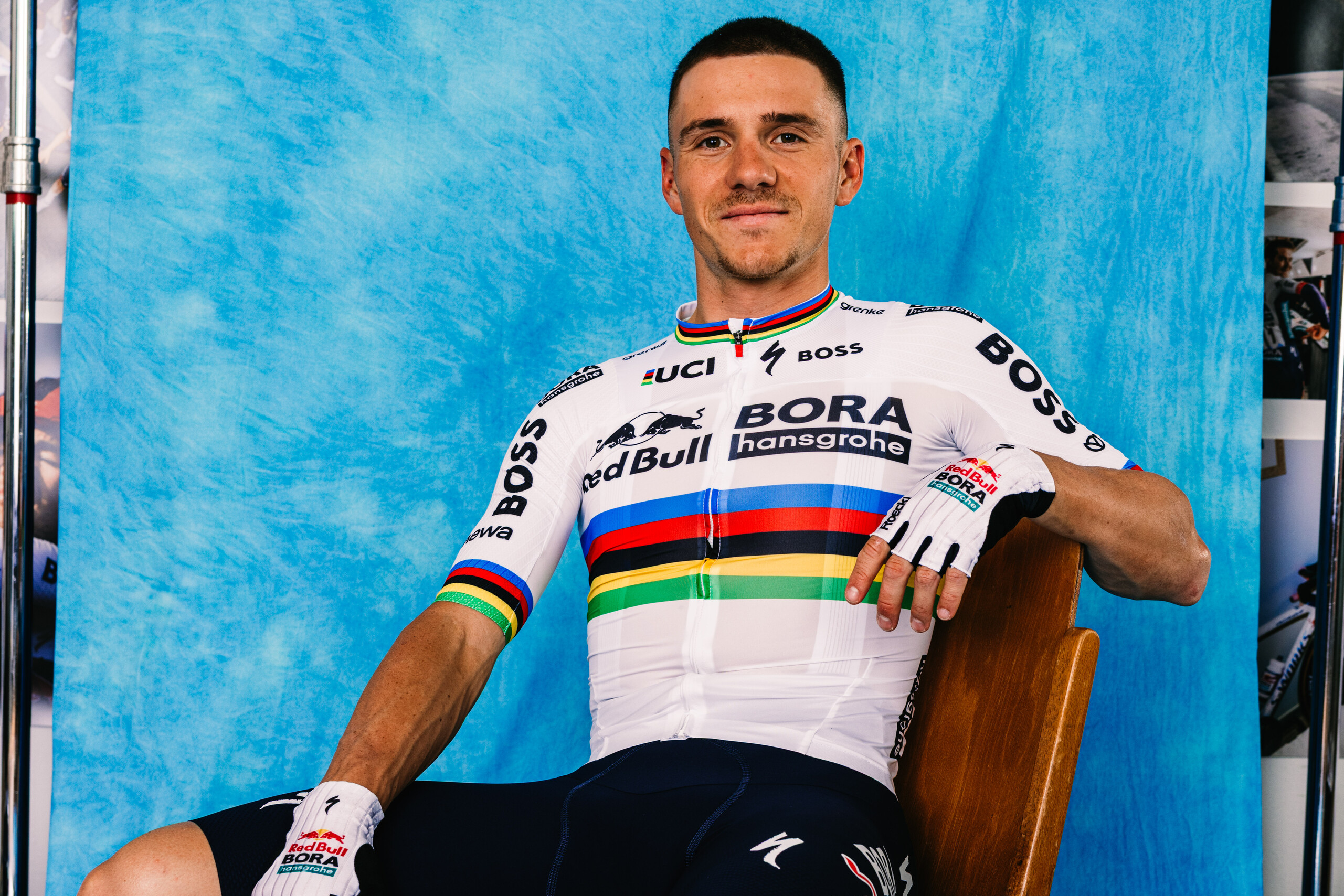Burst bubbles and blurred lines: British Cycling, Team Sky, and the cost of success
How the rise and fall of an empire has forced us to look at what we want from elite sport
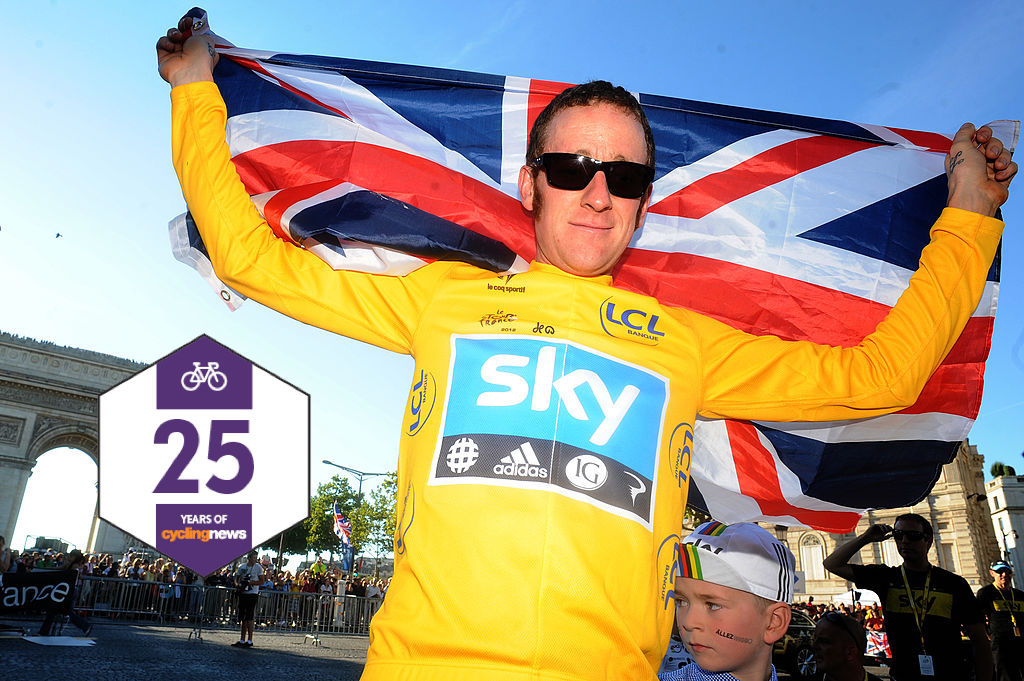
This year, Cyclingnews celebrates its 25th anniversary, and to mark such an important milestone, the editorial team will be publishing 25 pieces of work that look back at the sport over the last quarter of a century.
Richard Freeman drags himself through the revolving doors of the St James’ Buildings on Manchester’s Oxford Road, shuffles into the elevator, and presses that well-worn button that takes him up to the seventh floor. Another day, another grey tribunal room, another episode in a soap opera that has ticked the boxes of explosive drama and seedy intrigue, and has long since passed into the realms of the drawn-out and downright sad.
We're moving deeper into winter and it's now more than eight years since that summer of 2012. Eight gold medals from British cyclists at their home Olympics in London. Bradley Wiggins, the first Briton to win the Tour de France. Mark Cavendish, the world champion who raised his arms on the Champs Elysées. The sport was soaring and the trajectory seemed limitless.
So how has it come to this?
It’s a tale that cuts right to the heart of what sport is for. British Cycling and Team Sky: two organisations that rose together and fell together. As they try to pick up the pieces, Freeman’s presence in the dock is an ongoing hangover, a constant reminder of the cost of success.
Team Sky – now Ineos Grenadiers – was set up ahead of the 2010 season as an off-shoot of the national federation, a chance for Dave Brailsford to take his marginal gains from the track out onto the open road.
That resources from a publicly-funded national body were being shared with a professional outfit promoting a corporate company, was problematic from the outset. That it took so long to come back and bite them reflects the bubble in which the sport was expanding in Britain in the 2010s. It was a wave of gold medals, yellow jerseys, world records, sideburns, and pleasant pastures populated by middle-aged men in lycra.
The latest race content, interviews, features, reviews and expert buying guides, direct to your inbox!
That idea of national pride is important. The Olympic Movement is essentially built on the stuff. All these years on from the origins of the Games in Ancient Greece, where sporting prowess was political leverage, the Olympics remain a battleground for what’s now known as ‘soft power’.
Success sends out a message to the world but it’s one that also resonates within a country’s own borders. London 2012 apparently failed on its mission to ‘inspire a generation’, but the decline in grass-roots sport participation was offset by the feel-good factor of Britain’s best-ever medal count. According to a BBC poll, 83% of people said the Games had a positive effect on the UK and 80% thought it had made people more proud to be British. Four years on, when Britain surpassed its home haul and placed second on the medal table in Rio, it was a similar story. Our athletes, it was said, had gone some way to stitching together a country that had been driven apart by the Brexit vote.
Liz Nicholl, chief executive of UK Sport, said it herself in Rio: "I think we’ve all seen and felt the impact of medal success on ourselves and on the UK. Success in sport can inspire the nation, make everybody proud and unite the nation. There’s no doubt about that. We can all see it and feel it."
It’s not an athlete’s responsibility to heal societal wounds. Their pursuit is a personal one, but when they’re funded by public money and kitted out in the colours of the flag, they become national ambassadors. When a government sees they can deliver something its manifesto cannot, they become political pawns.
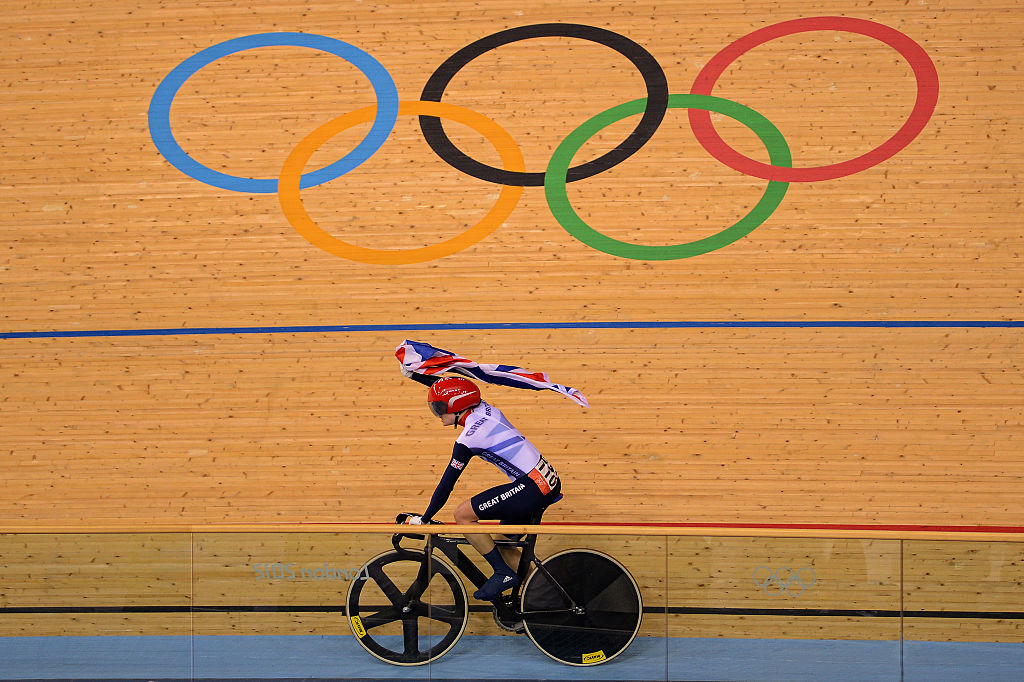
British Cycling could tell the story of the culture of national sport in Britain in the past two decades - summed up in two words: no compromise. It was after the 2004 Athens Games, where Britain finished 10th in the medal table, that UK Sport first used the term to describe its approach to Olympic and Paralympic funding.
The money - which comes from the British national lottery and is topped up by the taxpayer - is streamlined towards the sports with the best chance of bringing medals home. There’s no concern for how many people practise each sport, nor for how the underfunded ones are meant to become strong enough to be deemed worthy of funding. So millions are ploughed into modern pentathlon, whose five events most people couldn’t name, while sports like basketball and badminton are left with literally nothing.
Cycling always had a natural advantage. It’s rife with what Britain’s sporting administrators would call 'medal potential'. On top of the four road racing medals, there are no fewer than 12 up for grabs on the track. Peter Keen, who’d coached Chris Boardman to gold in 1992, grasped this when he became performance director of British Cycling around the time lottery funding was introduced in 1997.
The British Cycling Federation, as it was then known, had been in crisis. Dwindling membership numbers, overdrawn bank accounts, and conflicts of interests were discussed in Parliament (a circle that would be completed some 20 years later). Working under the new president Brian Cookson and the new chief executive Peter King, Keen spearheaded a revolutionary World Class Performance Plan, pitching for funding on the basis that the sport should be grown from the top down.
It would soon become the best-equipped track cycling set-up in the world. There were four medals in 2000 and 2004, but the breakthrough came in Beijing in 2008, with 12 medals on the track and two more on the road. World records tumbled as Hoy, Pendleton, Wiggins, Trott, Kenny, and the rest cemented Britain’s dominance in London and Rio.
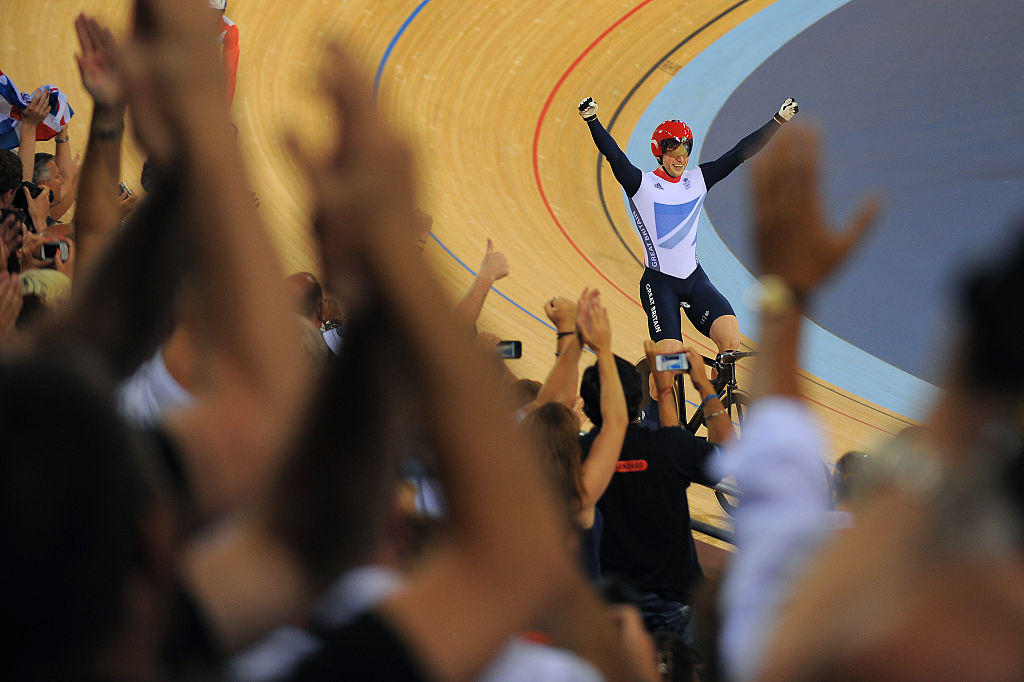
But the gold would soon be accompanied by something far less glorious.
Allegations of bullying, sexism, and discrimination, all wrapped up in what’s now a depressingly familiar phrase: culture of fear. Things started to come crashing down when sprinter Jess Varnish came forward with her allegations against Shane Sutton, which he has denied. She’d been dropped from the British Cycling programme after publicly criticising management at a disastrous 2016 Worlds, and claimed Sutton had told her to "go and have a baby", which Sutton denied. Victoria Pendleton and Nicole Cooke were among the riders to back Varnish up, the latter calling out "sexism by design" at the national federation.
It soon emerged Sutton had allegedly referred to para-cyclists as "gimps" and "wobblies", which he has denied, and an independent investigation was commissioned. It detailed a culture of fear and an absence of leadership in a report that was far more damning in its original form, as leaked to a national newspaper, as opposed to the final version that had been filtered through lawyers.
The internal investigation into the Varnish case, where one of nine allegations was upheld, was described as "inept", and British Cycling’s inability to police itself was underlined when a 2012 performance review finally wound up on UK Sport’s desk some four years after it was published. Having only received a sanitised summary at the time, Nicholl accused British Cycling of a cover-up and a "complete lack of transparency".
She certainly has a point, but UK Sport should not disregard its own role in all of this. It has engineered a system in which federations constantly need to produce results in order to justify their funding and so their existence. This pressure inevitably filters down to the management, through the coaching staff, and onto the shoulders of the athletes.
With each new sport that has been engulfed by similar scandal - swimming, gymnastics, rowing, bobsleigh, archery, canoeing - British Cycling’s issues look less like the anomalous failings of one organisation and more like the logical consequence of the British sporting system.
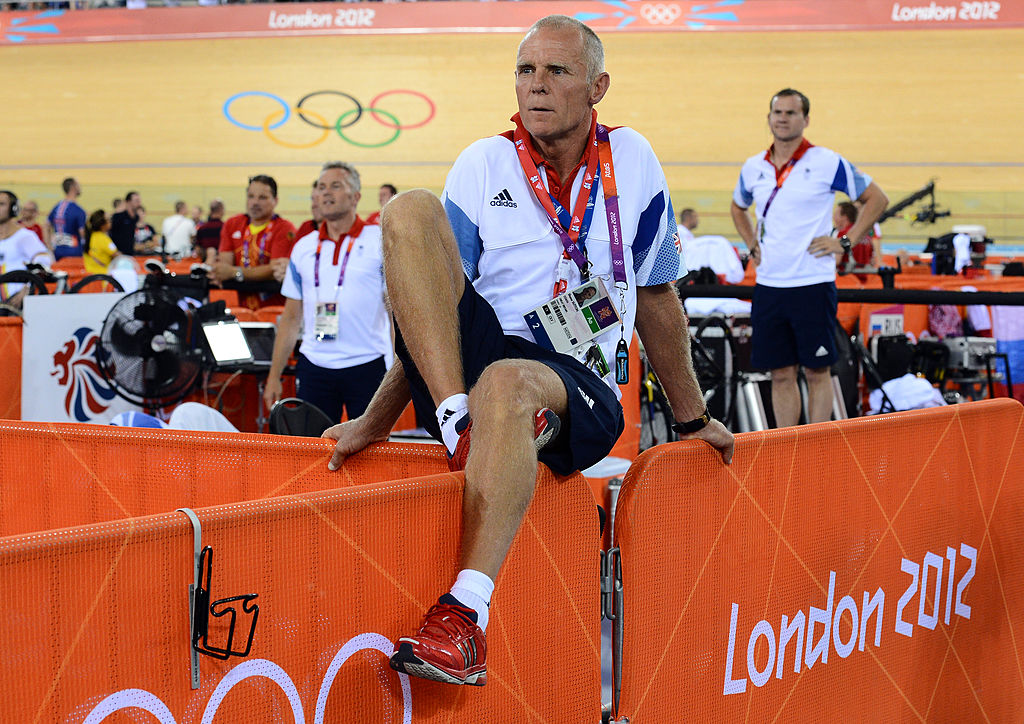
The Jess Varnish case went on to highlight another important aspect of how lottery-funded British athletes are treated. She wanted to take legal action against British Cycling for unfair dismissal but was recently told by an employment tribunal that she has no grounds to do so, given she was never technically an employee.
Riders are considered recipients of grants, rather than salaried ‘workers’, with ‘no mutuality of obligation’ and none of the contractual provisions most working adults enjoy. It was the same brick wall Wendy Everson had ran up against in 2002, and one sport federations are terrified of falling down. We talk about a 'duty of care' from these bodies towards athletes but any such duty is literally written out of the agreement.
As Callum Skinner, a former gold medal-winning sprinter, pointed out to the Daily Mail, it’s a situation in which abuse is allowed to germinate.
"If you lodge a complaint as an athlete […] quite often you are lodging a complaint against an employee of that organisation and they might have the legal backing of the employer and the athlete is relying on their own resource. You have the precariousness of the athlete contract which pretty much states you can be dismissed at any point. You are fearful of repercussions. It is very difficult to make a complaint."
Skinner, incidentally, retired last March at the age of 26, when he suffered a deterioration in his mental health and requested time off - as recommended by head doctor Steve Peters - only for a senior management figure to turn him down.
"We can't have all our athletes having a three-week holiday or else we wouldn't have a team," he was told, as revealed in a recent BBC podcast. "It was basically a little bit of a cry for help and it became all too much about performance and not enough about getting better."
The comments echo one elite swimmer’s claim that they "weren’t treated as humans, but as medal targets" - or, in the eyes of one gymnast, "pieces of meat".
British Cycling’s troubles have forced us to confront the question of what we want from elite sport, and how we treat those who provide us with it - in this case at our own expense.
It should be pointed out that, in contrast to the prevailing wind in British sport, cycling participation has demonstrably increased in the past 15 years. But does this one end - albeit one that has far-reaching benefits for society - justify the means? Is the wellbeing of these people a fair sacrifice at the altar of success? Do the two things even have to be mutually exclusive?
"You would win more if athletes were treated with humanity and understanding," Skinner believes.
Team Sky
If the question of ‘what’s the point of British Cycling' should provoke some serious soul searching, the point of Team Sky - now Ineos Grenadiers - is more clear-cut. To reduce it to one broad brushstroke, the team exists to promote and so make money for a corporate company. That’s professional sport - it’s essentially big business and there isn’t the same responsibility on a societal level.
At Team Sky Brailsford had greater freedom to set the terms of engagement. The way he did so was what ultimately reduced the team’s reputation to tatters - in the words of a Parliamentary report.
At present, there have been no proven anti-doping infractions, which would be the green light for most teams to sail through the court of public opinion, but Brailsford set the bar rather higher.
"We like to think that we're at the forefront of promoting clean cycling," he told the Guardian early in 2011, the team’s second season. "That philosophy will always stay."
Lance Armstrong was yet to confess, but Floyd Landis had spilled the beans, and cycling was in the early stages of another doping scandal to rival the Festina Affair and Operación Puerto. Public trust in professional cycling had always been shaky but Brailsford told us his team was different and would restore it.
The philosophy may have been hollow from the start. Equally, it’s tempting to look at Sky’s chastening debut season in 2010 as a turning point, a realisation that you couldn’t be both whiter than white and yellower than yellow.
The following year, the team’s zero tolerance policy on staff with doping histories was relaxed, former Rabobank doctor Gert Leinders was hired, Freeman pushed to overhaul the medical protocols, the UCI’s no-needle policy was allegedly breached, the Jiffy bag was transported from Manchester to the French Alps, Bradley Wiggins received his first injection of triamcinolone acetonide ahead of the Tour de France, and a box full of testosterone was ordered to the team’s headquarters.
The team have always denied wrongdoing, insisting there was a medical need for Wiggins' injections. Leinders was dismissed in 2012 and Freeman has claimed the testosterone was intended to treat Sutton.
In 2012, Wiggins won the Tour and six more yellow jerseys would follow in the subsequent seven years. Brailsford himself acknowledged that the team’s above-and-beyond principles might have been holding them back at first. "You have your anti-doping policy but you need to weigh it up. And, actually, if the need of the team in performance was such…" It’s there, in black and white, in the very same interview in which he tells us the "philosophy will always stay".
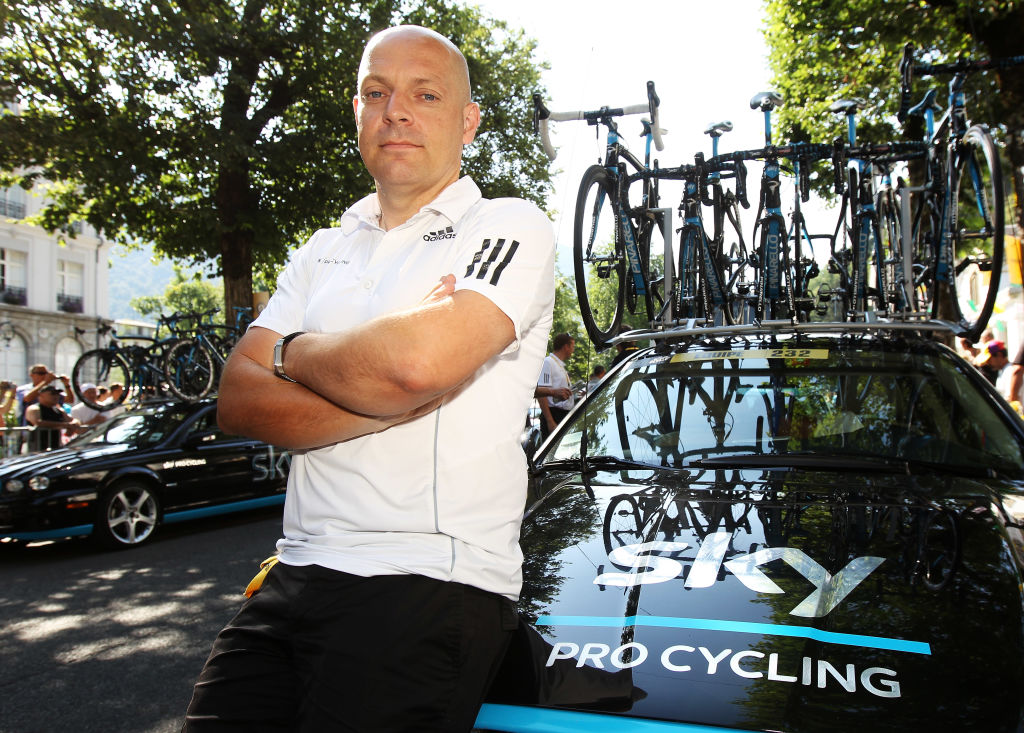
Contradiction and obfuscation have been hallmarks of a team that has existed in a sort of perpetual identity crisis. Shortly after Wiggins won the Tour, USADA published its Reasoned Decision, and Armstrong was booked for Oprah. The sport really was in crisis now, and Brailsford re-evaluated the team’s ethos.
Zero-tolerance was reinstated, and the notorious 'night of the long knives' inquisition led to the doping confessions and departures of a number of figures. At the start of the 2013 season, Brailsford said he wanted Team Sky to be "the most admired sports team in the world", which rested on four elements: "Having the best performances, the most engaged fans, the most satisfied partners, and, most importantly, that we’re recognised as being clean.
But what does 'clean' mean? The letter of the law or the spirit of it? In those early years, Brailsford would often talk of 'the line'. The concept was taken from the blue line on the track at velodromes, and printed on the jersey a sort of visual metaphor for the difference between right and wrong.
"We never cross it," he would say. He would also say - again, at the end of 2010 - that the line "can sometimes be a bit blurred". The string of curiously-timed TUEs, for corticosteroids abused by dopers past, paints a picture of a team that spoke of black-and-white while wading wholeheartedly into the grey.
When it came to the tug-of-war between being admired and being successful, Brailsford wanted to have his cake and eat it. As Jumbo-Visma have shown with their direct admission of ketone use, if you’re going to do things that are ethically questionable, better to own them. Some may not like it, but they’ll still respect the transparency.
Ah, transparency, that great promise. The same transparency that led to David Walsh, the journalist whose work had helped expose Armstrong, being embedded in the team, only to later claim he was ‘duped’. What was sought - and largely obtained, until most of this started to come out - was the credit for being transparent without the nuisance of having to be transparent; the credit for leading the sport’s clean-up act without the nuisance of having to do anything but the bare minimum of cleaning up.
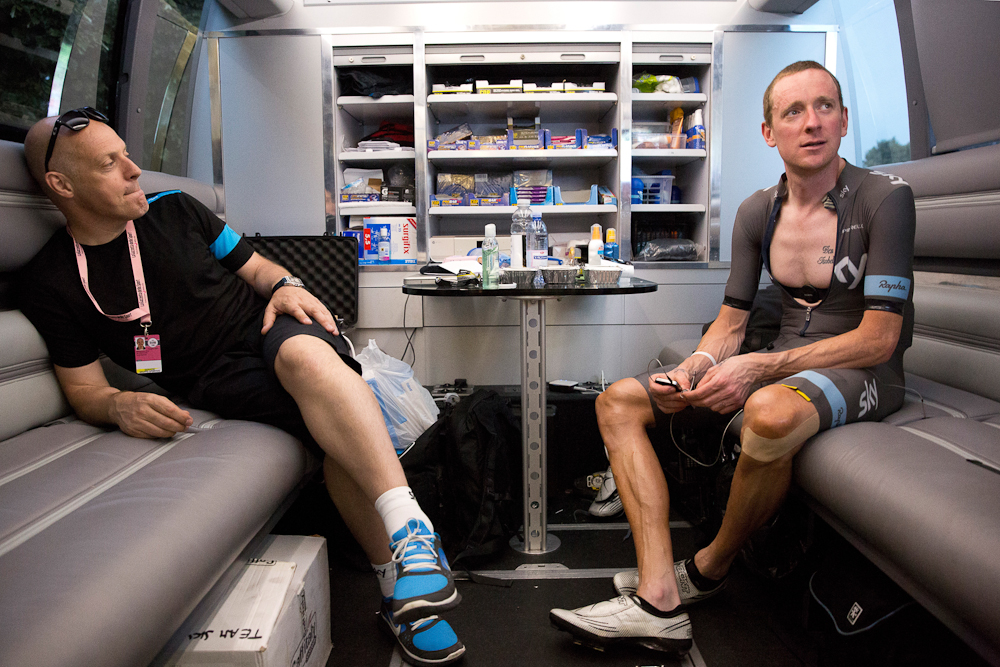
The biggest illusion of all is surely the famous ‘aggregation of marginal gains’.
Not that these marginal gains themselves are mythical. The logic that small improvements in different areas should lead to an overall improvement is indisputable. In fact, it’s pretty obvious, and the way these things were spun as revolutionary strokes of genius - as opposed to things most teams would do if they had the same amount of money, or indeed things some teams had already done - spoke volumes of that bubble in which the sport was expanding.
The popular British press loves to tear you down, but not before it has built you up, and Team Sky cultivated an environment in which journalists were invited to go out and ride Pinarellos under the Mallorcan sun, kitted out in Rapha gear and welcome to take it home with them. As I grappled with myself on a visit to Mallorca in my first year working for Cyclingnews, they were pulling people in while keeping them at arms’ length. Intimacy: another mirage.
So what did Team Sky actually stand for? The team’s pursuit of Tour de France success through an approach that saw their riders labelled 'skybots' would suggest that the idea of being ‘the most admired sports team in the world’ soon took a back seat. Likewise, both Parliament’s and Sutton’s description of the TUEs as “unethical” would suggest that, even if they remained within the letter of the law, they did little to advance the cause of clean cycling.
Team Sky, sponsored by a corporate giant but backed principally by cycling aficionado James Murdoch, didn’t really have to be anything to anyone, but tried to be all things to everyone. In the end, it’s hard to surmise they stood for anything much beyond winning (which is fine, until you pretend otherwise).
Again, the more relevant question is one we should ask of ourselves: what it is we want from all of this? Entertainment? Reflected glory? A way to make sense of our own lives? If we’re looking for morality in professional sport then perhaps we’re looking in the wrong place.
Picking up the pieces
So where are we now? In a way, both British Cycling and Team Sky have moved on, even if the Freeman hangover means there still hasn’t been a clean break.
2016 was the year the bubble burst, with Varnish’s testimony the trigger for what would snowball into an avalanche of controversy. I’ve written more than 3,000 words now and haven’t even mentioned Froome’s salbutamol case, Michael Barry’s allegations of tramadol abuse, Brailsford scrambling to bury the Jiffy bag story, Josh Edmondson breaking the no-needle policy, Simon Yates’ ban, Lizzie Deignan’s missed tests, the stockpile of corticosteroids, Gianni Moscon's racial abuse of Kevin Reza, Sky riders calling for Brailsford to resign.
Aside from Yates' ban, which was deemed 'non-intentional', no anti-doping rules have been breached, with charges against Froome dropped, and Deignan's suspension overturned by the Court of Arbitration for sport. Team Sky and British Cycling insist there was legitimate medical need for the supply of corticosteroids. Team Sky deny tramadol was abused and dismissed Edmondson at the time.
Of course, there will have been some major triumphs not touched directly by any of this, and that’s one of the tragedies: good work, by good people, tarnished by association. As my colleague William Fotheringham neatly put it: the aggregation of marginal doubts.
It was only after the investigations from UK Anti-Doping and Parliament that British Cycling and Team Sky definitively untangled themselves. Brailsford had gone full-time with Sky in 2014, but Simon Cope was still available to courier the Jiffy bag in 2011, and Shane Sutton continued to enjoy a fat retainer from Team Sky when he stepped back in 2013. That the chief executive of British Cycling had no idea his technical director was gainfully employed by another organisation said it all about the complete absence of serious governance.
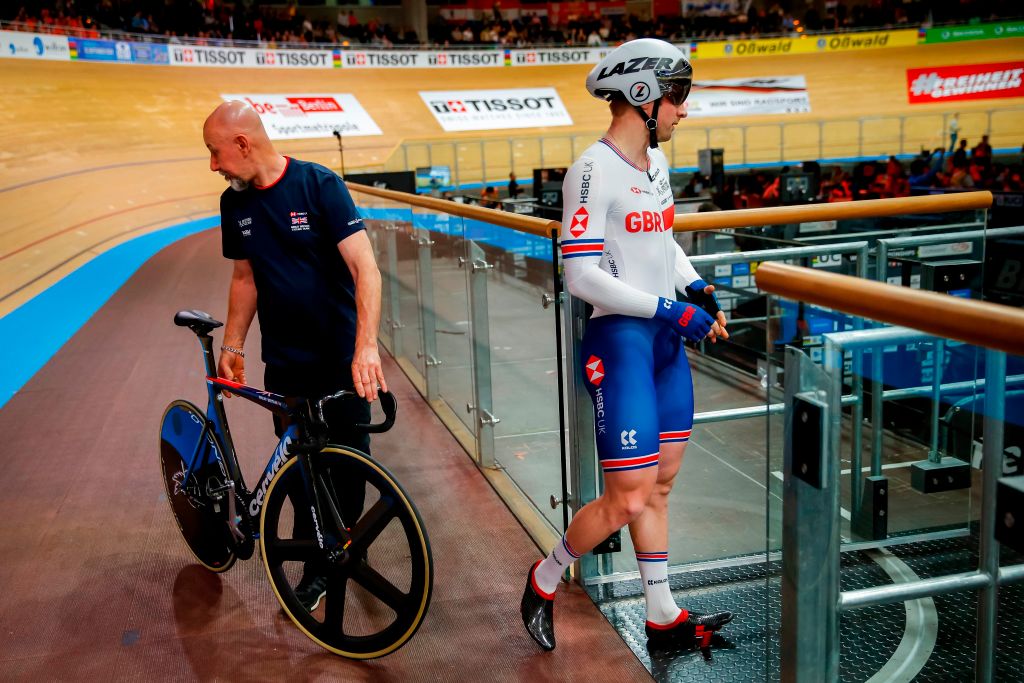
Change had to happen, and change came in the form of various ‘overhauls’, to use the management speak. Governance was overhauled, the leadership structure was overhauled, and medical protocols were overhauled. Meanwhile, a flurry of resignations left roles to fill at the highest level.
It’s telling that the new CEO, Julie Harrington, was recruited from the Football Association, performance director Stephen Park from sailing, and now Brian Facer - soon to be Harrington’s replacement - from rugby. This was not just about diversifying expertise, but cycling needing to be squeezed into the straightjacket of a modern sporting administration. The new faces were joined by new layers of bureaucracy and the identity of the whole organisation shifted dramatically.
"That’s the thing that’s lacking now in British Cycling: someone who actually knows what they’re talking about. It’s all about box ticking," Wiggins said earlier this year, complaining that Cavendish had no path to Tokyo.
"It was just a case of opening a few doors so you could get qualified, knowing you would deliver on the day, which you do and always did - three world titles, Olympic medal and all that. That’s sort of been taken away now. They’d rather someone qualified for all the World Cups, then finished 10th in the Olympics. I think it’s shit, to be honest, but hey, cycling has changed so much."
Shit, it may be, but maybe not as shit as what we’ve just been through.
Then again, can we really say with any confidence that British Cycling has turned a corner? After all, it was only last year, post-overhauls, that Skinner stepped away. Only last week he was accusing Park of "rank hypocrisy" on Twitter. It was in relation to coach being fired over 'inappropriate relationships with riders', and another has since quit without explanation.
A new philosophy
As for Team Sky, well, they became Team Ineos in 2019. Murdoch had left Sky and the company suddenly seemed less keen on ploughing millions into a team that had been dragged through the mud so recently. Brailsford weathered the storm and all the predictions of his resignation and, to his credit, he went and found a replacement with pockets just as deep.
They won the Tour again with Egan Bernal, but now they’re supposedly out to emulate the ‘adventuring’ instincts of their new billionaire owner Jim Ratcliffe.
"What I liked about this is, we’ve done the train, we’ve done the defensive style of riding and won a lot doing that, but it’s not as much fun, really, compared to this, is it?" Brailsford said at the end of the Giro, where his team had just won seven of the 21 stages and grabbed the overall title.
"At the end of day, the sport is about racing, it’s about emotion and the exhilarating moments of racing, and that’s what we want to be. We’re Grenadiers now."
It might have seemed like brazen opportunism, given they came to Italy to control the race for the favourite Geraint Thomas, but perhaps there’s more to it. Brailsford did acknowledge that this new philosophy wasn’t his latest innovation but a reaction to the direction in which the sport is heading. With a crop of young all-rounders ushering in a new generation, Tom Pidcock would seem the ideal flagbearer for this new dawn. On the other hand, the signings of Richie Porte, Adam Yates, Laurens De Plus, and Dani Martínez point to yet more stockpiling in the name of Grand Tour domination.
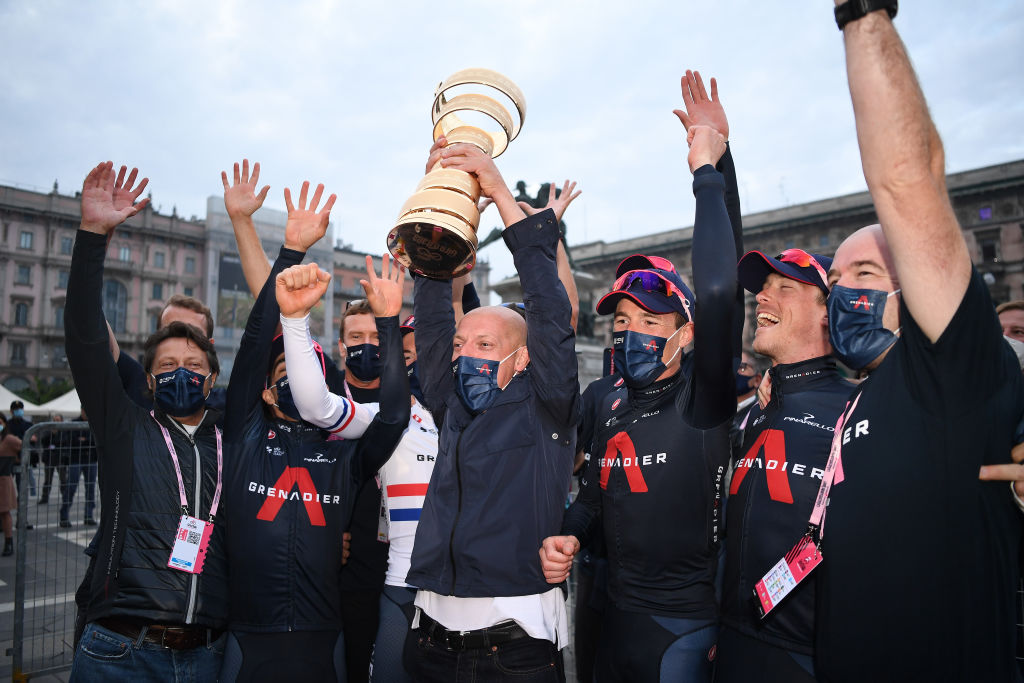
In any case, the new philosophy wasn’t just consigned to the Milan breeze, as Brailsford returned to it in a recent interview with CyclingTips.
“We’re going to shift to athlete first, people first, individual rather than team,” he said. “I never thought I’d see the day where I’d say, ‘I’m going to do away with the school uniform look.’ I never, ever, ever thought I’d say that.”
I never thought I’d hear him say it. Has he really reached the point where he’s willing to sacrifice results in the name of fun? Has his appetite for winning finally been sated? Does the allure of real admiration now pull harder than victory and dominance?
Maybe this is what the team stands for now. Maybe these are just more empty words. We’ve probably earned the right to reserve judgement for now.
Speaking of judgements, Freeman should know his fate by May - not that you feel that will add much clarity or closure. In the meantime, British Cycling will head down the road to Tokyo, and Ineos will stride into the post-Froome era. Two organisations who rose together, fell together, and are now reconstructing themselves apart.
What have we learned from the story so far? And what do we expect from the next chapter? It seems we’ve worked out that winning isn’t everything, but will taking part ever be enough?
Today's best Black Friday deals
Today's cycling-related highlights from the Black Friday sales. For even more, view our guide to the best Black Friday bike deals where you'll find on all things cycling, including bikes, helmets, clothing and more.
Today's best deals: USA
- Amazon: 50% off Garmin Instinct smartwatch |
$299.99| $149.99 - Jenson USA: 44% off Castelli Pro rain jacket
$249.99| $139.99 - Rapha: 50% off Women's Souplesse Race Cape |
$295.00| $147.50 - Competitive Cyclist: 25% off Shimano S-Phyre thermal gloves
$90.00| $67.50 - Oakley: 30% off new Sutro Lite sunglasses |
$176.00| $123.20 - Chain Reaction Cycles: LifeLine 18-piece tool kit
$73.99| $49.99 | 32% off - ProBikeKit: Continental GP5000 road tyre
$79.99| $36.50 | 54% off - Wiggle: Fizik R4B Road Shoes
$200.00| $114.00 | 43% off
Today's best deals: UK
- Amazon: 23% off Garmin Forerunner 35 |
£129.99| £99.99 - Wiggle: 41% off Assos Schlosshund Equipe RS jacket |
£265.00| £156.00 - Argos: GoPro Hero7 White for £99.99
- Wiggle: 44% off Kask Valegro helmet |
£179.99| £99.99 - Oakley: 20% off Sutro sunglasses |
£135.00| £108.00 - ProBikeKit: 300-lumen rear Lezyne light for under £35.00
- Tredz: 29% off Blackburn Mag 5 turbo trainer |
£139.99| £99.99 - Wiggle: Muc-Off Cleaning kit | 40% off at just £17.99
- Chain Reaction Cycles: 25% off Garmin Edge 520 Plus
£199.99| £149.99
Patrick is a freelance sports writer and editor. He’s an NCTJ-accredited journalist with a bachelor’s degree in modern languages (French and Spanish). Patrick worked full-time at Cyclingnews for eight years between 2015 and 2023, latterly as Deputy Editor.

